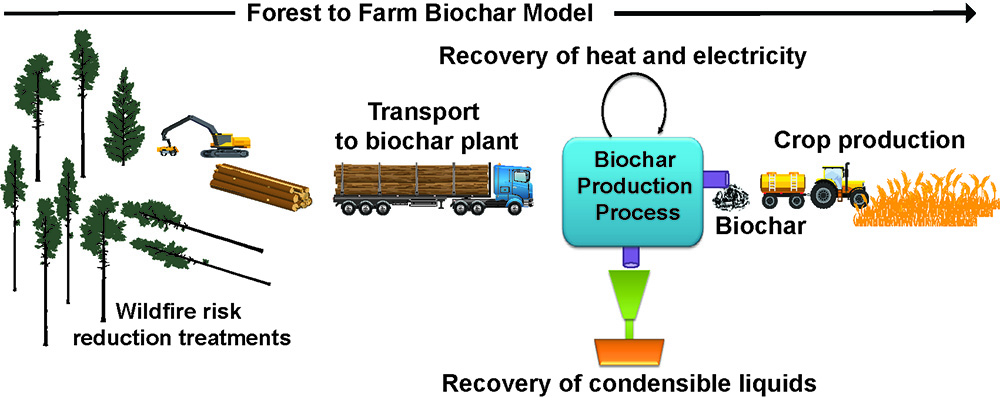Opportunities for Biochar Production to Reduce Forest Wildfire Hazard, Sequester Carbon, and Increase Agricultural Productivity of Dryland Soils; Lead PI - John Sessions
The study aims to inform policy for Oregon and stakeholders by evaluating whether large-scale biochar production is technically feasible, logistically scalable, economically competitive, and environmentally beneficial at the landscape scale. If the outcome suggests biochar production meets these minimum criteria, the study could potentially trigger industrial interest in supporting the development of forest-to-farm biochar markets, benefiting rural economies that are typically based on forest and agricultural commodities.

Below are products of the study:
- Overview - Poster of project overview
- Opportunities For Biochar Production to Reduce Forest Wildfire Hazard, Sequester Carbon, and Increase Agricultural Productivity of Dryland Soils - BIOCHAR 2016 Symposium August 22-25, OSU
- Can Biochar Link Forest Restoration with Commercial Agriculture? - Economic Evaluation of a Forest‐to‐Farm Biochar Paradigm
- Tethering and Biochar: Two Emergent Technologies with Implications for Fuels Treatments on Federal Forest Lands - Joshua H. Petitmermet Thesis
- Campbell JL, Sessions J, Smith D, Trippe K (2018) Potential carbon storage in biochar made from logging residue: Basic principles and Southern Oregon case studies. PLoS ONE 13(9): e0203475.
- Sessions J., et al (2019) Can biochar link forest restoration with commercial agriculture? Biomass and Bioenergy 123: 175–185
- Sessions J., et al. Opportunities for biochar production to reduce forest wildfire hazard, sequester carbon, and increase agricultural productivity of dryland soils. IWFL Final Report, updated April 2019
- Petitmermet, J., J. Fried and J. Sessions. 2019. Estimating Biomass Availability and Cost When Implementing Forest Restoration with Tethered Harvest Systems. Journal of Forestry 177(4):323-339. doi:10.1093/jofore/fvz033
- Petitmermet, J., J. Sessions, J. Bailey, and R. Zamora-Cristales. 2019. Cost and productivity of tethered cut-to-length systems in a dry forest fuel reduction treatment: A case study. Forest Science 65(5):581-592.
- Sessions, J., K. Trippe and D. Smith. (2019). Researchers study supply chain feasibility of biochar for agricultural use. Oregon Statewides.
- Fried, J., J. Petitmermet and J. Sessions. (2019). Extending BioSum to optimize multi-decade forest restoration and evaluate biochar facility feasibility in the Upper Klamath Basin. Presented by Fried at the 2019 FIA Stakeholder Science Meeting, Knoxville, TN. November 19-21, 2019.